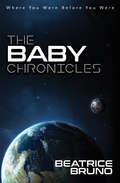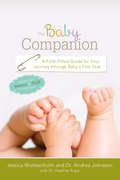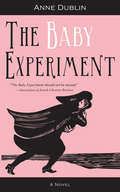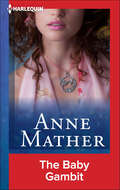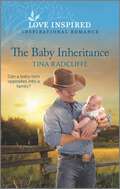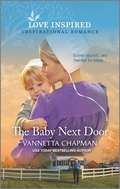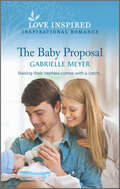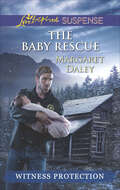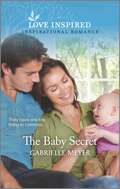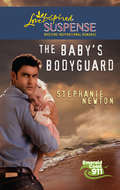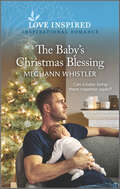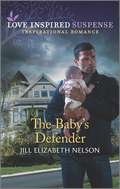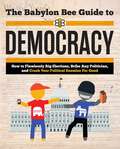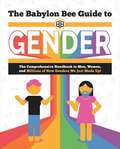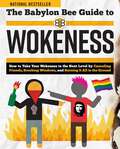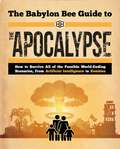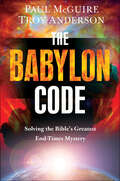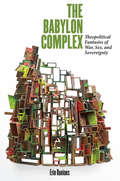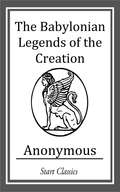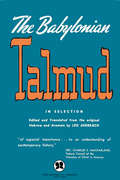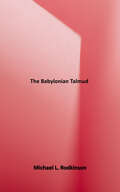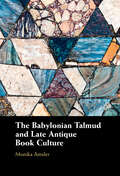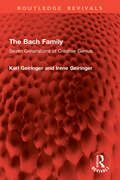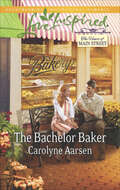- Table View
- List View
The Baby Chronicles: Where You Were Before You Were
by Beatrice BrunoA novel about four women created by God with an eternal purpose in mind—and their remarkable journey . . . The Baby Chronicles is the story behind the scenes of creation of four &“pre-born&” baby girls who eventually meet in the US Army: Beverley, Emmaline, Joyce, and Margarette Ann. Although many of the pre-borns you meet are excited about the prospect of having an &“Earth assignment,&” at least three of these four would rather stay in Heaven with Abba. They don&’t want to carry out their mission on Earth, especially with the families they have been assigned to. If you have ever wondered where you were before you existed on Earth, this book will give you pause to think of the possibilities you had before you were even born.
The Baby Companion: A Faith-Filled Guide for Your Journey through Baby's First Year
by Jessica Wolstenholm Dr Andrea Johnston Dr Heather RupeThe baby's first-year guide for women who long to experience God's fullness and presence throughout their journey. They don't have to walk through their first days of motherhood alone. The creator of Life is their ultimate Baby Companion.The Baby Companion offers every new mom a guide that includes both information and encouragement for her journey through baby's first year. Equipping women with practical advice and resources including scheduling, child development, budgeting, and practical parenting, this book guides the reader on a faith-filled journey paved with truth, reflection, and Scripture.Some of the elements include baby stats, development checker, baby care, common questions, mommy care, truth for the journey, and more. Organized into chapters that follow baby's monthly progress, the reader will have everything she needs to be informed and peaceful during her baby's first year.
The Baby Experiment
by Anne DublinWhen 14-year-old-Johanna learns that her orphanage is experimenting on babies, she kidnaps one of them and sets off for Amsterdam. Johanna is a 14-year-old Jewish girl who lives in Hamburg, Germany, in the early 18th century. She feels stifled by the daily drudgery of her life and dreams of seeing what lies outside the confines of the Jewish quarter. Johanna lies about her identity and gets a job as a caregiver at an orphanage. Until it’s too late, she doesn’t realize a secret experiment is taking place that results in the deaths of babies. Deciding to kidnap one of the orphans, Johanna sets off for Amsterdam. She faces many dangers on her journey, including plague, bandits, storms and, not least of all, anti-Semitism. Johanna has a lot of courage and determination, but will it be enough to save the baby and reach her destination? Will she finally find a place where she can be free?
The Baby Gambit
by Anne MatherWould a lie keep them apart?SEA, SUN AND... MATTEOExpecting sun and relaxation from her stay with a friend in Italy, Grace Horton actually found herself walking into an emotional minefield. Her friend was clearly set on marrying Matteo di Falco. He was wealthy, gorgeous and equally determined-to see a lot more of Grace!Grace wondered what she could do to prevent her friend from getting hurt-and stop herself from falling into Matteo's arms. Then some shocking news was revealed, which threatened to keep Matteo by her friend's side forever....
The Baby Inheritance: An Uplifting Inspirational Romance (Lazy M Ranch #1)
by Tina RadcliffeAn infant in need… But she&’s a package deal. After the tragic loss of his best friends, rancher Drew Morgan willingly accepts guardianship of their six-month-old baby—until he learns big-city professor Sadie Ross has temporary custody as well. Opposites in every way, the pair now has eight weeks together on Drew&’s ranch to decide who will become the permanent parent. Could this makeshift family turn into something real…before the deadline is up?From Love Inspired: Uplifting stories of faith, forgiveness and hope.Lazy M Ranch Book 1: The Baby InheritanceBook 2: The Cowboy Bargain
The Baby Next Door (Indiana Amish Brides #7)
by Vannetta ChapmanSome secrets are harder to keep…in this novel from USA TODAY bestselling author Vannetta ChapmanCan she help her neighborwithout exposing the truth?When Amish single mother Grace Troyer and her baby girl move back home, Adrian Schrock can’t resist the little family next door. But his plan to nudge Grace out of her shell by asking her to cook for Englischers on his farm tour doesn’t go over well. After all, Grace is worried the job will expose secrets she hopes to keep buried… From Harlequin Love Inspired: Uplifting stories of faith, forgiveness and hope.Indiana Amish BridesBook 1: A Widow’s HopeBook 2: Amish Christmas MemoriesBook 3: A Perfect Amish MatchBook 4: The Amish Christmas MatchmakerBook 5: An Unlikely Amish MatchBook 6: The Amish Christmas SecretBook 7: The Baby Next Door
The Baby Proposal: An Uplifting Inspirational Romance
by Gabrielle MeyerTo be his guardians They must say &“I do.&” Drew Keelan is the last person Whitney Emmerson imagined would propose to her. But when their infant nephew is orphaned and the will stipulates that to adopt him they must be married, Whitney and Drew have no choice. It&’s one thing to wed for custody, but do they have what it takes to make a marriage of convenience last till death do them part?From Love Inspired: Uplifting stories of faith, forgiveness and hope.
The Baby Quilt (Heartsong Presents #566)
by Joyce LivingstonJACKIE'S PAST WON'T LEAVE HER ALONE.... Jackie Reid left her old life behind to start a new life in Alaska, where she tells her friends she’s a widow. But when Sam Mulvaney, her ex-husband, shows up, Jackie realizes her simple life is about to get very complicated. Lying lips are an abomination to the LORD; but they that deal truly are his delight.” —Proverbs 12:22 Sam left her seventeen years earlier because he believed she aborted their baby, and Jackie still can’t convince him she wanted the child and had a miscarriage. Jackie’s sole pleasure becomes the quilt she is making for the baby she lost. Can there be renewed love and healing for Jackie and Sam? Will God use the baby quilt to somehow show Jackie and Sam the truth about forgiveness?
The Baby Rescue (Witness Protection)
by Margaret DaleyOPERATION BABY RESCUE To rescue an abducted infant from a baby-smuggling ring, U.S marshal Colton Phillips has to work with FBI agent Lisette Sutton. But their tactics couldn't be more different. The too-pretty agent goes by the book, whereas Colton breaks rules to get the job done. Colton vows to keep his heart out of the job, but his unwanted attraction to Lisette lowers his guard. Now Lisette-and an innocent child-are in grave danger, and Colton will stop at nothing to save them. Witness Protection: Hiding in plain sight
The Baby Secret: An Uplifting Inspirational Romance
by Gabrielle MeyerThrown together by a wedding. Bound by a secret from the past. When maid of honor Emma Holt arrives at the wedding resort early, she&’s immediately drawn to best man Clay Foster and his six-month-old daughter. Despite the heartbreak they&’ve both faced in the past, Emma and Clay find themselves falling for each other as the festivities unfold. But Emma&’s keeping a secret from Clay, and revealing it will change everything…From Love Inspired: Uplifting stories of faith, forgiveness and hope.
The Baby's Bodyguard
by Stephanie NewtonA shocking discovery When an anonymous text message arrives with photos of tiny hands and feet-and GPS coordinates-Florida cop Ethan Clark believes it's a prank. Then he follows the coordinates to an abandoned toddler. Handing Janie Doe over to caring child services worker Kelsey Rogers, Ethan thinks his job is done...until the little girl turns out to be a kidnap victim. To protect the child, Ethan and Kelsey stumble into an investigation that digs up a tragedy from Ethan's past. Will they uncover the truth before the kidnappers bury the trail forever?
The Baby's Christmas Blessing: An Uplifting Inspirational Romance
by Meghann WhistlerA new single dad gets a second chance at love when he hires his childhood sweetheart as a nanny in this inspirational romance.Nothing will be merry about Steve Weston’s Christmas if he doesn’t find a nanny for his newborn nephew fast. But the best choice is Chloe Richardson, the woman he pushed away years ago. He has a second chance at making the season’s joy last for a lifetime—unless he allows old wounds to separate them once more . . .
The Baby's Defender (Love Insp Susp True Lp Trade Ser.)
by Jill Elizabeth NelsonSomeone’s watching them…and only he can protect mother and childWestley Foster is the first person Cady Long turns to when she’s attacked in her new home. As a security expert, her late husband’s military buddy is the perfect choice to guard her and her baby daughter…and figure out how the attacker is getting inside. But as the unknown enemy closes in, can West keep them safe long enough to catch her would-be killer?
The Babylon Bee Guide to Democracy
by Babylon BeeFrom the authors of the bestselling Babylon Bee Guide to Wokeness, and the minds behind the popular website The Babylon Bee comes a tongue-in-cheek guide to Democracy where you'll learn how to rig elections, bribe politicians, and crush your political enemies for good.In The Babylon Bee Guide to Democracy, America's favorite satirists take you into a world you might have thought was beyond parody--politics. From closed-door meetings of bureaucrats deciding the fates of millions to preposterous lies from the campaign trail, The Bee skewers our political overlords with matchless wit. In this visual guide, you&’ll learn how to rig an election, how to stage an insurrection, which political party you should join, and more--everything you need to fully participate in the worst political system of all time (except for all the others).
The Babylon Bee Guide to Gender (Babylon Bee Guides)
by Kyle MannFrom the satirical minds behind the viral sensation The Babylon Bee comes the latest installment of its guide series. This looks at the two "original gangsta" genders—male and female—shows us the progressively insane slide into the multiplying number of genders that has lately been spiraling out of control.The third entry in the bestselling Babylon Bee Guide series explores the whole colorful rainbow of genders. Men! Women! And millions more! Featuring gorgeous custom artwork, infographics, charts, and interactive features, every page will catch the eye with hilarious observations about the differences between the two original genders and all the new ones we&’ve just recently made up. Features will include: Diagrams documenting the biological and behavioral differences between men and women How to tell if you are a man or a woman How to choose your gender How to change genders if the mood strikes Interviews with experts in which we ask, &“What the heck is a woman, anyway?&” What it means to be a father What it means to be a mother (or is that &“birthing person&”?) How to get a good woman/man to fall for you Comprehensive coverage of all the imaginary genders besides men and women Hall of fame: best men and best women in human history Through The Babylon Bee&’s patented satirical voice, this book will tell you everything you need to learn about gender identity, transgenderism, and biological sex. Use it to teach your kids before their first-grade teacher does!!
The Babylon Bee Guide to Wokeness
by Babylon BeeTo show the world you're a good person—and also to avoid getting canceled and having your life ruined by a Twitter mob—you need to get WOKE. In The Babylon Bee Guide to Wokeness, the writers of satirical sensation The Babylon Bee tell you how to choose your pronouns, blame everyone else for your problems, and show the world how virtuous you are with virtue-signaling profile pictures and stunning and brave hashtags. A tongue-in-cheek guide to the far Left&’s obsession with intersectional insanity, The Babylon Bee Guide to Wokeness will help you laugh at the state of our culture so you don&’t cry.
The Babylon Bee Guide to the Apocalypse (Babylon Bee Guides)
by Babylon BeeFrom the satirical minds behind the viral sensation The Babylon Bee comes the latest installment of its guide series that will teach you how to survive every potential end-times situation, from the coming communist takeover to the rise of artificial intelligence-powered death robots. The apocalypse is nigh! With the imminent threat of climate change, alien invasion, zombie attacks, dangerous MAGA terrorists, and countless other possible scenarios, the world could literally end before you finish reading this sentence. Oh, good—looks like it didn&’t. But that doesn&’t mean you're safe. In The Babylon Bee Guide to the Apocalypse, the writers of trusted fake news site The Babylon Bee teach you how to survive in every potential end-times situation, from the coming communist takeover to the rise of artificial intelligence-powered death robots. It&’s the only way to be prepared! This book includes literally everything you need to prep for the apocalypse including the following: Handy attack moves to fight off zombies, commies, and other brainless monsters Easy bunker construction guides so you can get started building your own apocalypse safe space today Interior decorating tips that will wow any guests into your 50-story underground nuclear silo Weapon assembly DIY guides on how to put together the very best tools for fighting off all kinds of post-apocalyptic horrors Reports from the multiverse where we have a reporter on the ground telling you how the world ends in every possible universe Attractive infographics and charts on every page that even YOU can understand Helpful financial tips for what kind of currency and precious metals to hoard for the end of the world Funny stick figures While other books just tell you that we&’re doomed and the collapse of Western Civilization is imminent, only The Babylon Bee Guide to the Apocalypse gives you the tools you need to survive it. If you don&’t buy a copy, it&’s not like it&’s the end of the world. OH WAIT—IT IS.
The Babylon Code: Solving the Bible's Greatest End-Times Mystery
by Troy Anderson Paul McGuireWhat if God embedded a code in the Bible that could only be cracked in the end times--a prophetic cypher that reveals how the four blood moons and the biblical Shemitah are just signs of the beginning of end-time events?Unlocking a great mystery that has puzzled scholars for nearly two thousand years, THE BABYLON CODE reveals how powerful forces are now at work to create a global government, cashless society, and universal religion as predicted by the prophets. The result of a five-year journalistic investigation, THE BABYLON CODE takes readers on a spellbinding journey to explore the link between the world's most secret organizations, the Bible's greatest prophetic riddle, and what world-renowned evangelist Billy Graham describes as a convergence in end-time signs for the first time in history. This prophetic mystery book pieces together the apocalyptic puzzle--uncovering what may be not only the biggest story and political scandal in modern history, but also the secret to both our survival and our salvation.
The Babylon Complex: Theopolitical Fantasies of War, Sex, and Sovereignty
by Erin RunionsBabylon is a surprisingly multivalent symbol in U.S. culture and politics. Political citations of Babylon range widely, from torture at Abu Ghraib to depictions of Hollywood glamour and decadence. In political discourse, Babylon appears in conservative ruminations on democratic law, liberal appeals to unity, Tea Party warnings about equality, and religious advocacy for family values. A composite biblical figure, Babylon is used to celebrate diversity and also to condemn it, to sell sexuality and to regulate it, to galvanize war and to worry about imperialism.Erin Runions explores the significance of these shifts and contradictions, arguing that together they reveal a theopolitics that tries to balance the drive for U.S. dominance with the countervailing ideals and subjectivities of economic globalization. Examining the confluence of cultural formations, biblical interpretations, and (bio)political philosophies, The Babylon Complex shows how theopolitical arguments for war, sexual regulation, and political control both assuage and contribute to anxieties about waning national sovereignty. Theoretically sophisticated and engaging, this remarkable book complicates our understanding of how the Bible affects U.S political ideals and subjectivities.
The Babylonian Legends of the Creatio
by AnonymousThe Babylonian Legends of the Creation and the Fight Between Bel and the Dragon as Told by Assyrian Tablets From Nineveh contianing the following: "The Discovery of the Tablets" "Publication of the Creation Tablets" "The Object of the Babylonian Legend of the Creation" "Variant Forms of the Babylonian Legend of the Creation" "The "Bilingual" Version of the Creation Legend" "The Legend of the Creation According to Berosus and Demascius" "The Seven Tablets of Creation - Description of Their Contents" "The Seven Tablets of Creation - 1st, 2nd, 3rd, 4th, 5th, 6th, 7th" "Epilogue"
The Babylonian Talmud
by Leo AuerbachThe Talmud is a record of about a thousand years of accumulated Jewish learning and wisdom in all fields of endeavor: law, religion, ethics, history, science, and folklore. It includes Fathers of Mishna, the poor, sabbath, passover, atonement, fasting, childless widows, marriage contracts, adultery, divorces, civil law, laws of procedure, and oaths. This is the book to go to if you must know about Jewish history, law, and lore.
The Babylonian Talmud
by Michael L. RodkinsonThis is the most vital manuscript of conventional Judaism and the basic tool for learning the ethics behind its customs and regulations. The original text of the Babylonian Talmud. This English translation includes: - Standards of appointing judges to the supreme court (Sanhedrin), regulations of civil and criminal cases, when is someone acquitted or accused. - Regulations regarding the high priest, when he can judge or be judged. And regulations regarding the ruler, how many wives he can have, how much property he can own, etc. - Penalties due for criminal cases, including the four kinds of death penalty prescribed and how they ought to be executed. Enumeration of those who come under the category of stoning, burning, slaying, or choking. Who is considered a murderer deserving capital punishment and who is to be exiled. - Many more interpretations from the Torah, as this is considered to be the supplementing commentary to the five books of Moses. Folk sayings from The Talmud: "Either a friend or death." "He who has been bitten by a snake is scared of a rope." "Poverty follows the poor."
The Babylonian Talmud and Late Antique Book Culture
by Monika AmslerIn this book, Monika Amsler explores the historical contexts in which the Babylonian Talmud was formed in an effort to determine whether it was the result of oral transmission. Scholars have posited that the rulings and stories we find in the Talmud were passed on from one generation to the next, each generation adding their opinions and interpretations of a given subject. Yet, such an oral formation process is unheard of in late antiquity. Moreover, the model exoticizes the Talmud and disregards the intellectual world of Sassanid Persia. Rather than taking the Talmud's discursive structure as a sign for orality, Amsler interrogates the intellectual and material prerequisites of composers of such complex works, and their education and methods of large-scale data management. She also traces and highlights the marks that their working methods inevitably left in the text. Detailing how intellectual innovation was generated, Amsler's book also sheds new light on the content of the Talmud. This title is also available as Open Access on Cambridge Core.
The Bach Family: Seven Generations of Creative Genius (Routledge Revivals)
by Karl Geiringer Irene GeiringerWhen this volume was originally published in 1954 it was the first complete history of the Bach family from the 16th Century miller Veit to Wilhelm Friedrich Ernst (1759-1845), Johann Sebastian’s grandson. The author views the family as a whole and shows the characteristic similarities in their artistic and human attitudes as well as the most significant divergences. Equal stress is laid on the discussion of the personalities, against the swiftly changing historical scene, and on the music, for which the author was able to use vast, hitherto inaccessible material. Apart from describing the fascinating phenomenon of this musical family, the author gives a history of musical thought in the last 300 years.
The Bachelor Baker (The Heart of Main Street #2)
by Carolyne AarsenAn out-of-work mechanic finds hope and more in a smalltown Kansas bakery in this inspirational romance.Opening a business isn’t a piece of cake—something Melissa Sweeney discovers when an anonymous benefactor brings her to Bygones, Kansas. She can’t fulfill her longtime dream of starting up her own bakery without help. But with his traditional views of work and family, Brian Montclair is the unlikeliest candidate for the job. Even more surprising is the powerful attraction sprouting up between the rugged mechanic and his fiercely independent new boss. Brian’s heart and soul belong to his hardworking community that is slowly coming back to life. Melissa wants to be part of that transformation . . . if she can make Brian believe they can be true partners in everything—including love.The Heart of Main Street: They’re rebuilding the town one step—and heart—at a time.
